Discover the 5 best smart thermostat boiler models of 2025. Compare features, compatibility, and find the right smart heating solution for your home.
1. Introduction
In today’s world of rising energy costs and smart home automation, a smart thermostat boiler has become more than just a luxury—it’s a practical necessity. These intelligent devices are designed to give homeowners full control over their heating systems, and a smart thermostat boiler plays a key role in achieving that balance between comfort and cost efficiency.
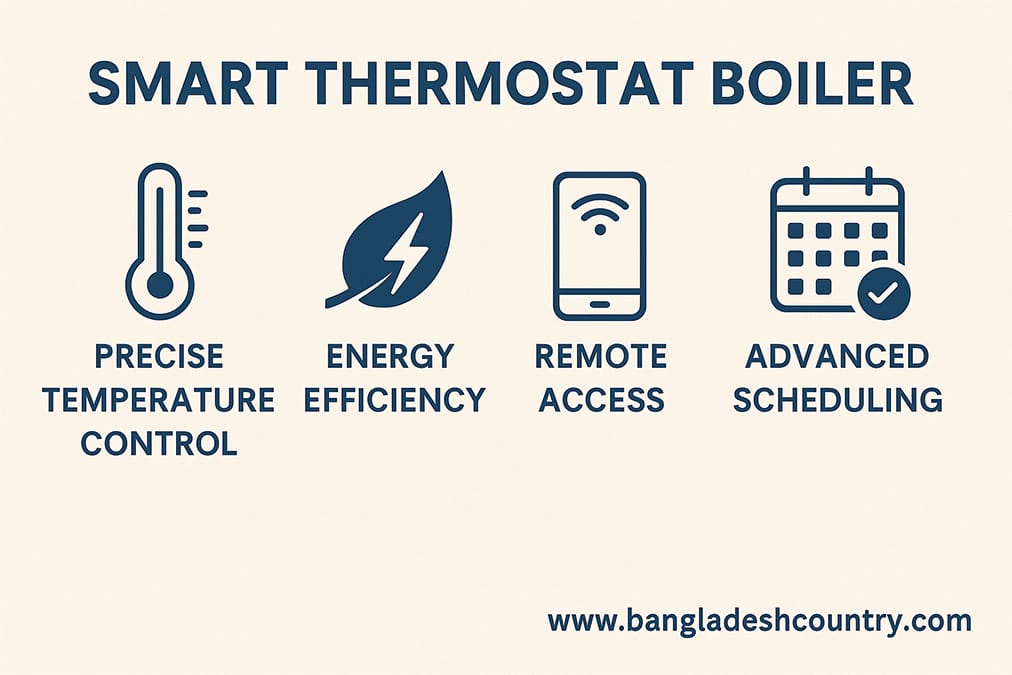
Unlike traditional thermostats that require manual adjustments, a smart thermostat for boiler systems uses advanced technology such as Wi-Fi connectivity, learning algorithms, and real-time data to manage your home’s temperature more efficiently. Whether you’re at home, at work, or on vacation, you can adjust your heating settings directly from your smartphone.
Many Americans are already turning to smart boiler thermostats to meet both their convenience and sustainability goals. In this article, we’ll explore the top-rated smart thermostats for boilers available in 2025, provide a side-by-side comparison, and help you choose the perfect model based on your heating needs, home type, and smart ecosystem.
2. What is a Smart Thermostat Boiler?
A smart thermostat boiler is an intelligent temperature control device that connects directly to your central heating system, usually a gas or oil-powered boiler. It allows homeowners to manage heat schedules automatically or remotely—often through a dedicated mobile app or by voice command via assistants like Alexa or Google Assistant.
Unlike standard programmable units, these thermostats can learn your routine, sense when you’re home or away using geofencing, and adjust temperatures accordingly. Advanced models can even provide energy usage reports to help you monitor and reduce consumption.
For example, a programmable boiler thermostat might let you set a schedule, but a smart thermostat goes further—it can adapt over time, optimize for outdoor weather, and integrate with other smart devices in your home.
Additionally, many models are compatible with a variety of systems, including 2 wire boiler smart thermostat setups, which are common in older homes. Newer models support wireless thermostat for boilers, reducing installation complexity and making it easy for homeowners to switch from outdated models.
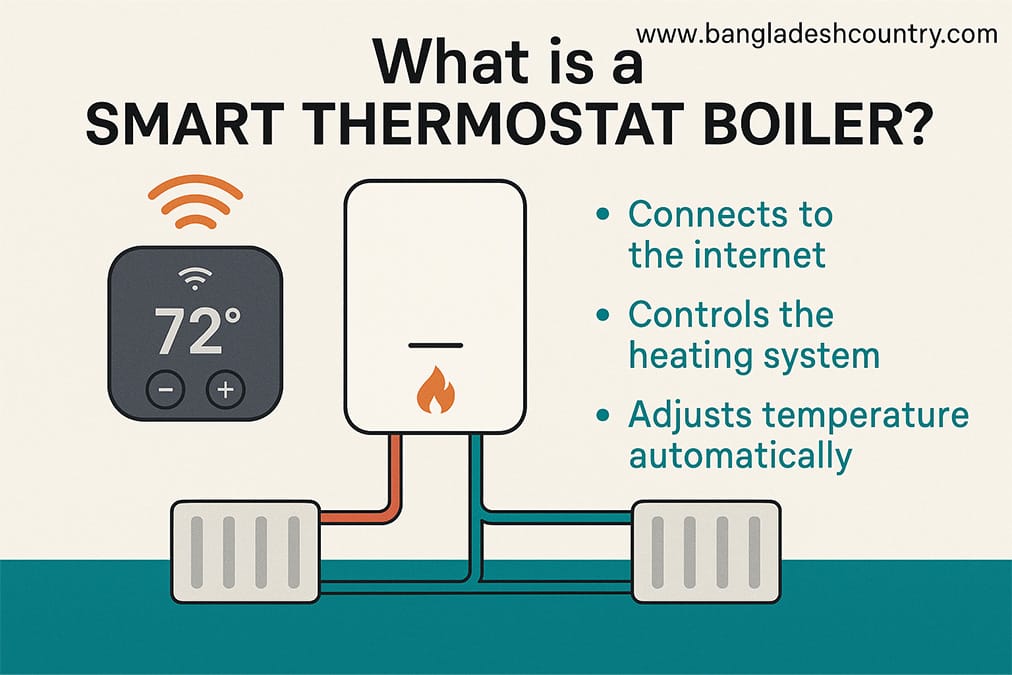
By choosing a smart heating control system, you’re not just upgrading your thermostat—you’re improving how your entire home operates.
3. Top Features to Look For in a Smart Thermostat Boiler
When selecting the best smart thermostat boiler for your home, it’s essential to consider more than just brand reputation or pricing. A truly effective model offers a combination of compatibility, smart features, ease of use, and energy-saving capabilities that align with your heating system and lifestyle.
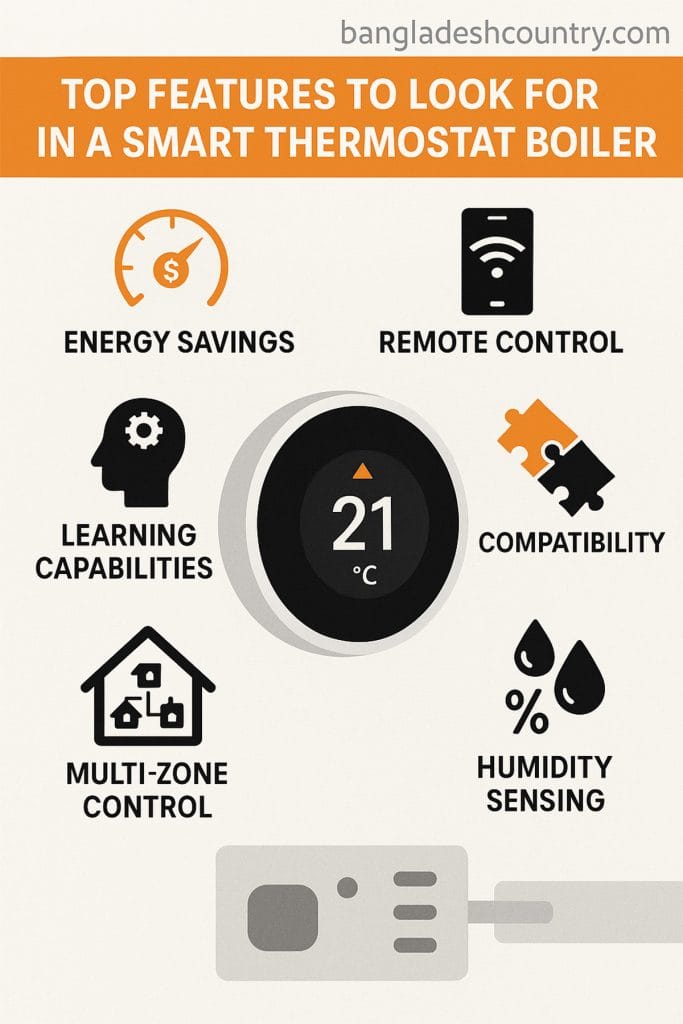
Below are the most important features to evaluate before making your purchase:
a. Compatibility with Your Boiler System
Not all thermostats work with every boiler. Before purchasing, make sure the device supports your specific heating setup—whether it’s a gas boiler, oil boiler, or combi boiler system. Many of the best models are designed to be boiler-compatible thermostats, but always double-check the specifications.
Older homes may require a 2 wire boiler smart thermostat, while newer systems may work with multi-stage or zoned heating systems. Some advanced models also support heat-only configurations and single-stage systems, making them flexible across a wide range of HVAC setups.
b. Wi-Fi and App Control
One of the core advantages of a smart thermostat for boilers is the ability to control your heating remotely. Whether you’re commuting or on vacation, you can adjust your home’s temperature through a mobile app—ensuring comfort when you arrive and savings while you’re away.
This feature becomes even more powerful when paired with smart home heating solutions like geofencing. The system can automatically lower the temperature when you leave the house and raise it again before you return, without any manual input.
c. Voice Assistant Integration
Many top models support popular voice assistants such as Amazon Alexa, Google Assistant, or Apple HomeKit. With Alexa-compatible boiler thermostats, for example, you can adjust your heating with simple voice commands like “Alexa, set the thermostat to 70 degrees.”
This hands-free control adds an extra layer of convenience—especially useful for elderly users or those with limited mobility.
d. Programmable Schedules and Adaptive Learning
A good programmable boiler thermostat lets you create daily or weekly schedules that automatically change the temperature according to your lifestyle. Even better are models with adaptive learning features that analyze your behavior and create automatic schedules based on your preferences.
Some thermostats offer learning thermostat boiler functions, which means the device optimizes its settings over time based on your usage patterns. This not only saves energy but ensures your home remains comfortable without constant manual adjustment.
e. Energy Monitoring and Reports
If you’re serious about reducing your carbon footprint, look for thermostats that offer detailed energy reports. These reports show how much energy your system uses daily, weekly, or monthly, and suggest ways to optimize further.
A smart thermostat boiler with energy monitoring capabilities helps you track savings over time—ideal for both eco-conscious homeowners and those watching their bills.
f. Installation Requirements
Some thermostats require a C-wire (common wire) for continuous power, while others are designed for 2-wire systems or battery-powered operation. If your setup lacks a C-wire, consider a thermostat that supports wireless installation or comes with a power extender kit.
Homeowners with a bit of DIY experience may prefer models with easy-installation guides, especially those designed for do-it-yourself setups. However, if you’re unsure, professional installation may be worth the added cost.
Comparison Table: 5 Best Smart Thermostat Boilers in 2025
| Model | Best For | Voice Assistant | Wi-Fi Enabled | Energy Monitoring | DIY Friendly | Boiler Compatible |
|---|---|---|---|---|---|---|
| Amazon Smart Thermostat | Budget & Alexa Homes | Alexa | Yes | Limited | Yes | Yes |
| Emerson Sensi ST55 | Easy DIY Installation | Alexa | Yes | Yes | Yes | Yes |
| Emerson 1E78-140 | Simple Heat-Only Systems | None | No | No | Yes | Yes (Heat-only) |
| Honeywell RTH6360D | Weekly Programming | No | Limited | No | Yes | Yes |
| Google Nest Thermostat | Smart Home Integration | Google Assistant | Yes | Yes | Yes | Yes |
Quick Comparison Insights:
- Amazon Smart Thermostat: Ideal for users in the Alexa ecosystem looking for a budget-friendly smart boiler thermostat with essential features.
- Emerson Sensi ST55: Offers strong performance, Energy Star certification, and smart thermostat for boiler system functionality—all with an intuitive DIY setup.
- Emerson 1E78-140: A non-programmable boiler thermostat, great for older or simpler single-stage heating systems that don’t require smart features.
- Honeywell RTH6360D: Provides dependable 5-2 scheduling for those who want programmable boiler control without the complexity of full smart integration.
- Google Nest Thermostat: Best for users wanting a fully connected experience with learning algorithms, energy-saving automation, and Google ecosystem compatibility.
5. Detailed Reviews of the Best Smart Thermostat Boilers
1. Amazon Smart Thermostat

If you’re looking for an affordable yet capable smart boiler thermostat, the Amazon Smart Thermostat is a solid starting point. Designed with simplicity and energy efficiency in mind, this model integrates perfectly with Alexa-enabled homes and supports voice control through Echo devices.
It requires a C-wire for installation, which may be a hurdle in older homes, but the setup process is straightforward and DIY-friendly. Through the Alexa app, you can create heating schedules, monitor usage, and adjust temperature remotely—ideal for busy households aiming to reduce costs without sacrificing comfort.
Why It Stands Out:
- Budget-friendly
- Full Wi-Fi control for boiler systems
- Integrates seamlessly with Amazon Alexa
- Basic energy-saving automation features
Ideal For:
Homeowners who want a reliable, low-cost entry into smart heating control—especially those already using Amazon smart home devices.
2. Emerson Sensi ST55 Wi-Fi Smart Thermostat

This model is frequently ranked among the best smart thermostats for boiler systems—and for good reason. The Emerson Sensi ST55 combines advanced smart features with simple, tool-free installation, making it perfect for DIY enthusiasts.
It’s compatible with most boilers and supports 2 wire and C-wire systems, offering more installation flexibility. The mobile app gives you full control over temperature settings, scheduling, and energy tracking. Additionally, it supports voice assistant integration via Alexa, Google Assistant, and Siri.
Why It Stands Out:
- Supports a wide range of boiler types
- Strong energy monitoring tools
- Excellent mobile app with intuitive interface
- Works with most smart home platforms
Ideal For:
Users seeking a balance between price, functionality, and DIY ease—especially in older homes where wiring options are limited.
3. Emerson 1E78-140 Heat-Only Thermostat

Not every home needs full smart features. The Emerson 1E78-140 is a non-programmable thermostat ideal for single-stage boiler systems. Its strength lies in its simplicity: you set the desired temperature manually, and it maintains consistent heat.
It doesn’t offer Wi-Fi connectivity or scheduling, but it’s incredibly reliable and affordable. If you need a basic, no-frills control for your heating system, this unit gets the job done.
Why It Stands Out:
- Best option for basic boiler heating control
- Clear digital display
- Easy setup with standard 2-wire systems
- Long-term durability
Ideal For:
Homeowners who don’t need automation but want dependable and accurate temperature control for boilers.
4. Honeywell Home RTH6360D Programmable Thermostat

This thermostat offers 5-2 day scheduling—letting you program weekdays and weekends separately. While not fully “smart” in the modern sense, it delivers consistent performance and helps lower energy costs through basic automation.
It works with a wide range of HVAC systems including gas and oil boilers, making it a flexible option for many households. Although it lacks app control or voice features, it’s a good middle-ground between traditional and smart solutions.
Why It Stands Out:
- Simple, effective programmable thermostat for boilers
- Easy-to-read backlit display
- Offers predictable savings through scheduled heat cycles
- Compatible with most common heating systems
Ideal For:
Users who want programmable features without the complexity of apps and smart thermostat boiler connectivity.
5. Google Nest Thermostat
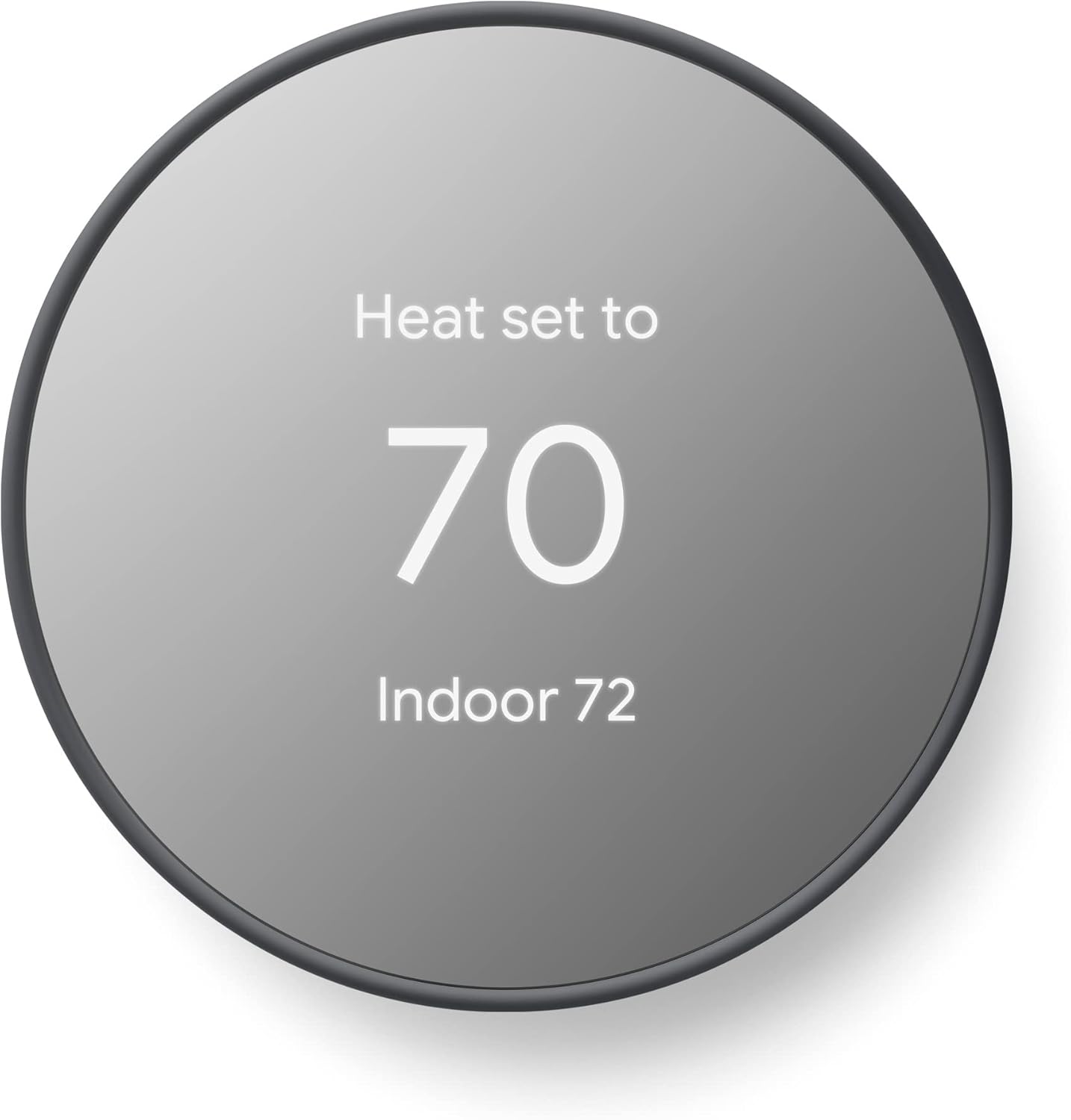
The Google Nest Thermostat is a premium option for tech-savvy homeowners seeking a full smart home heating solution. It combines sleek design with powerful features like auto-scheduling, energy usage tracking, and geofencing.
This thermostat works with a broad range of boiler configurations, including 2-wire and 3-wire systems. It learns your heating habits and automatically adjusts to save energy, earning it widespread acclaim for sustainability and performance.
Why It Stands Out:
- Smart learning adapts to your routine
- Full mobile app control and Google Assistant integration
- Attractive design with a high-resolution display
- Provides monthly energy reports
Ideal For:
Homeowners wanting advanced automation, high energy efficiency, and smooth integration with Google smart ecosystems.
6. Smart Thermostat Boiler Buying Guide
Choosing the right smart thermostat boiler is about more than just picking the most popular model. Your decision should be based on compatibility with your existing heating system, your household’s usage patterns, and which features offer the most value for your lifestyle.
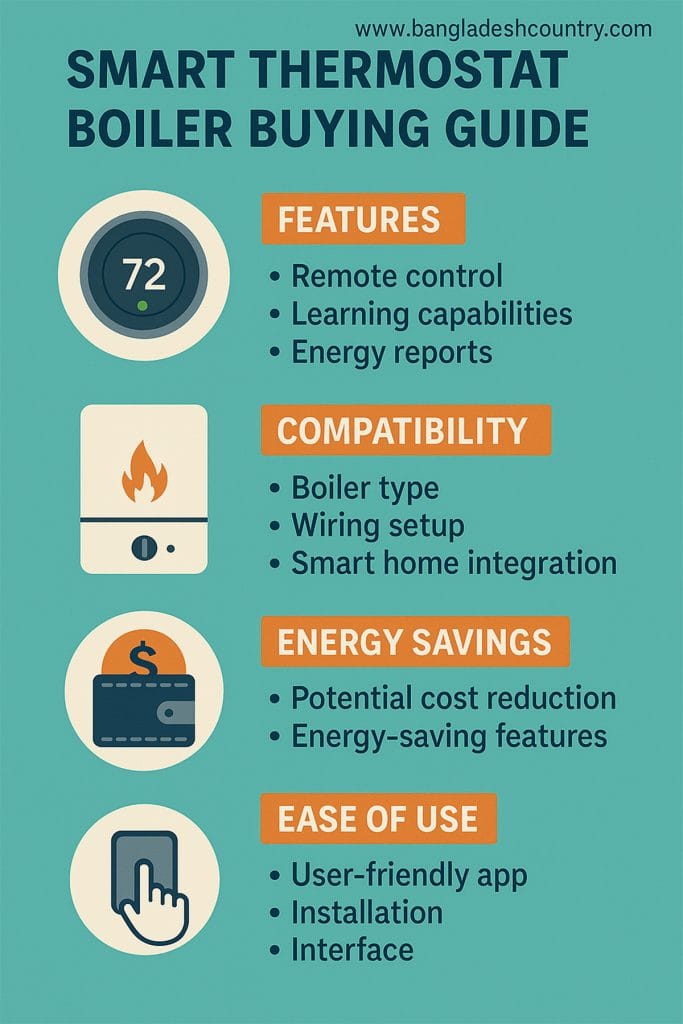
Here’s a step-by-step breakdown to help you make a confident choice:
a. Confirm Compatibility with Your Heating System
Start by identifying what kind of boiler you have: is it gas, oil, or a combi boiler? Many smart thermostats are designed to be boiler compatible, but older systems—especially those that use 2-wire setups—may limit your options. Look for models that clearly state support for single-stage heating, heat-only systems, or low-voltage HVAC.
Also, if your system lacks a C-wire, you’ll need to either:
- Choose a thermostat that works without it, or
- Use a C-wire adapter or power extender kit, if supported.
b. Decide Between Smart vs Programmable
If you just want simple automation without Wi-Fi or app control, a programmable boiler thermostat will suffice. These models let you create schedules for weekdays and weekends, helping reduce energy waste when no one is home.
However, for true convenience and energy savings, a smart thermostat for boiler systems is the better choice. These devices offer remote control, learning algorithms, and voice assistant support, providing more flexibility and automation.
c. Look for Key Smart Features
Here are some features that make a difference in daily use:
- Mobile App Control: Essential for adjusting settings on the go.
- Learning Capabilities: Thermostats like the Google Nest adapt to your routine automatically.
- Geofencing: Uses your phone’s location to adjust heating when you leave or return.
- Energy Usage Reports: Helps track and reduce your consumption over time.
- Multiple Zone Support: Allows for different temperatures in different areas of your home (if your heating system supports zoning).
- Voice Control: Works with Alexa-compatible boiler thermostats or Google Assistant for hands-free temperature management.
d. Installation Considerations
Some thermostats are easier to install than others, especially if your existing setup is already compatible with a smart thermostat boiler that supports DIY installation. If you’re planning to install it yourself, look for models that are marketed as DIY-friendly, such as the Emerson Sensi ST55. Make sure installation guides are clear, and check whether the thermostat supports your wiring setup.
If you’re unsure about compatibility or lack the right wires, hiring a professional installer may be the safest route—especially with more complex systems.
e. Match Features to Budget
Prices for smart thermostat boilers can range from under $100 to over $250. Here’s a general rule of thumb:
- Under $100: Basic smart features, usually works with Alexa only, fewer advanced options.
- $100–$200: Full Wi-Fi control, voice assistant integration, some energy reports, good compatibility.
- $200+: Premium design, learning algorithms, robust energy tracking, multi-platform support, better long-term savings.
Consider your home size, daily routine, and whether features like learning or energy reports will pay off over time.
7. Frequently Asked Questions (FAQs) of Smart Thermostat Boiler
Can I use a smart thermostat with any boiler system?
Most modern smart thermostat boiler models are designed to be compatible with a wide range of systems, including gas, oil, and combi boilers. However, you should always verify compatibility—especially if your system uses 2-wire connections, or if it’s a heat-only boiler. Manufacturers like Emerson and Honeywell usually list supported HVAC types on their websites.
What’s a C-wire, and do I need one for installation?
A C-wire (common wire) provides continuous power to your thermostat. While many wireless thermostats for boilers now support battery-powered operation, others—like the Amazon Smart Thermostat—require a C-wire for reliable performance. If your system lacks a C-wire, you can:
- Use a C-wire adapter, or
- Choose a thermostat designed for 2-wire boiler setups.
Do smart thermostats really save money on heating bills?
Yes, a well-configured smart thermostat for boiler systems can reduce your heating costs significantly—often by 10–20% annually. Features like geofencing, learning algorithms, and programmable schedules prevent unnecessary energy use. Models like the Google Nest Thermostat also provide monthly energy reports so you can monitor your savings over time.
Are smart thermostat boilers hard to install?
Not necessarily. Many smart thermostat boilers come with detailed installation guides, and models like the Emerson Sensi ST55 are built for easy DIY installation. If your system is older or has non-standard wiring, you might need professional help. But for most standard systems, installation takes under an hour with basic tools.
Can I control my smart thermostat boiler with Alexa or Google Assistant?
Yes. Many smart thermostats for boilers now support voice control. The Amazon Smart Thermostat works seamlessly with Alexa, while the Google Nest integrates fully with Google Assistant. Some models also support Apple HomeKit and IFTTT for broader smart home automation.
Do smart thermostats work with zoned heating systems?
Some advanced models do. If your home has multiple zones, you’ll need either:
- A multi-zone compatible thermostat, or
- Multiple smart thermostats paired with zone controllers.
Be sure to check manufacturer documentation for zoning support.
8. Final Verdict: Which Smart Thermostat Boiler Is Right for You?
There is no single best choice for every homeowner when it comes to selecting a smart thermostat boiler. The right option depends on your specific boiler type, comfort with technology, installation preferences, and how automated you want your heating system to be.
Below is a breakdown based on typical user profiles:
Best Overall Performance – Google Nest Thermostat
The Google Nest Thermostat offers premium design, smart learning capabilities, remote access, and energy-saving insights. It is ideal for users who want intelligent automation and seamless integration with the Google ecosystem.
Recommended for: Smart home users, energy-conscious families, and homeowners who want maximum automation.
Best Budget Smart Option – Amazon Smart Thermostat
For those looking to enter the smart heating space without overspending, the Amazon Smart Thermostat is an excellent value. It works smoothly with Alexa-compatible boiler systems, supports mobile app control, and offers basic scheduling.
Recommended for: First-time smart home users and budget-focused buyers using Alexa.
Best for DIY Installation – Emerson Sensi ST55
This thermostat stands out for its compatibility with various boiler types and ease of installation. With strong Wi-Fi features, detailed energy usage reports, and flexible scheduling, the Emerson Sensi ST55 is a practical choice for hands-on homeowners.
Recommended for: DIY enthusiasts and households with older 2-wire boiler systems.
Best for Simple Heating Needs – Emerson 1E78-140
If you’re looking for straightforward, non-programmable control of a heat-only boiler, this model is reliable, affordable, and free of unnecessary complexity.
Recommended for: Homes with basic heating setups, users who prefer manual operation, and landlords outfitting rental properties.
Best for Weekly Programmable Scheduling – Honeywell RTH6360D
This unit offers robust 5-2 programming (weekday/weekend schedules) without smart features. It’s easy to operate and compatible with a wide range of boiler systems.
Recommended for: Families with consistent routines and users seeking predictable energy savings without relying on apps or Wi-Fi.
Final Thought
A smart thermostat boiler is more than just a gadget—it’s a powerful, strategic upgrade that combines intelligent temperature control with real savings and automation. Whether you’re modernizing an older boiler or outfitting a new smart home, choosing the right thermostat means aligning technology with your lifestyle. Review your heating needs, consider your boiler type, and pick the model that will work hardest for you year-round. Since you have read the entire article, you can view this article: Perilla Seeds: 7 Powerful Benefits You Must Know



